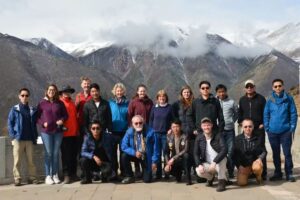This innovative research partnership brought together palaeobiologists, climate modellers and conservation scientists from both countries. They worked to develop solutions for preserving our planet’s vulnerable ecosystems. The first step aimed to understand past biosphere behaviours.
About the project
The BETR programme was jointly funded by the Natural Environment Research Council and China’s Natural Science Foundation between 2017 and 2022. It focused on understanding how ecosystems have responded to environmental changes throughout geological history.
By examining fossil records and combining these findings with advanced climate modelling techniques, researchers developed more accurate predictions of past landscapes. They discovered how vulnerable species might respond to current and future climate challenges.
One component of the BETR programme was the ‘Understanding Monsoon and Biodiversity Relevant to Landscapes and Livelihoods in Asia’ (UMBRELLA) project. The broad aim of this project was to better understand the evolution of the climate and ecosystem throughout eastern Asia during the last 66 million years. It explored outcomes that help us understand what might happen in our warming world.

Part of the UMBRELLA team in Eastern Tibet. Credit: BETR team
The UMBRELLA legacy consists of academics from both China and the UK across several research groups at different academic institutions skillsets and specialisations required to undertake such ambitious projects.
The UK and China have much to offer on leading the biodiversity and climate change debate. Both countries have prioritised research on environmental science and biodiversity to address our ongoing climate emergency.
The bilateral partnership in palaeobiodiversity provides crucial insights on dealing with the current biodiversity crisis, predicting future responses to climate change, and enabling solutions to strengthen biodiversity and economic resilience.
The scientific, political and global impact of UMBRELLA
The BETR project has delivered several significant outcomes:
The discovery of a 38-million-year-old fossilised fan palm in the Tibetan Plateau has revised scientific understanding of the region’s geological evolution. By applying new sediment dating methods, geochemical analyse and high-resolution modelling, the team has rewritten elements of the area’s history and provided fresh insights into ecosystem responses to environmental change.
During the project Professor Alice Hughes was based at Xishuangbanna Tropical Botanical Garden in south-western China and the University of Hong Kong. She sits on the international Convention on Biological Diversity and Convention on International Trade in Endangered Species of Wild Fauna and Flora committees. She also attends the biodiversity special policy study group of the Chinese Academy of Sciences. She has drafted policy recommendations for the Chinese State Council, ensuring that research findings eventually translate into practical conservation measures.
The programme has established sustainable research partnerships between UK and Chinese institutions, facilitating knowledge exchange and researcher mobility between the two countries.
The research directly supports both nations’ environmental commitments by providing crucial data on biodiversity resilience and climate adaptation strategies at a time when these issues have become global priorities.
Success factors and implications
To continue building on this successful foundation, the UK-China collaboration will need to:
- continue developing predictive models to help identify which ecosystems and species are most vulnerable to climate change
- expand research into how the paleontological record can serve as an analogue for near-future climate conditions
- further integrate research findings into policy frameworks to support pragmatic, economically viable conservation and resilience strategies
- extend the partnership model established through BETR to address other environmental science challenges, as demonstrated by the recent UK-China Climate Adaptation and Resilience Conference and related Conference of the Parties (COP) events
- leverage the expertise developed through this collaboration to influence global biodiversity and climate resilience efforts
- the Bristol Group solved a 30-year climate modelling problem, which could significantly improve understanding of future warming effects. This innovation was applied and used to reconstruct climate for “Prehistoric Planet”
- inform responsible management of our shared planet and further our understanding of the Earth system through future partnerships between both the UK-China
Find out more
Watch Prehistoric Planet official trailer and Prehistoric Planet Season 2 official trailer for more information

